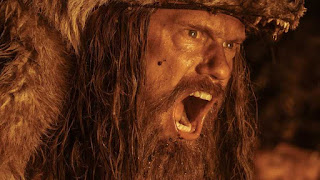The
Northman
Dir:
Robert Eggers
Scr:
Sjon, Robert Eggers
Phot:
Jarin Blashchke
Ed:
Louise Ford
Not a lot of gags.
None, in fact. ‘The Northman’ is very serious. So very serious that, if you don’t buy into its premises, you will spend your time with this movie tittering at the grandiose and gory events that unfold onscreen.
"The Northman" is a Viking saga, set in the late 9th-early 10th centuries, filled with larger-than-life characters. Our hero is Amleth (Amleth=Hamlet, get it?), who as a child, witnesses his king-father’s assassination at the hands of his brother, Fjolnir the Brotherless (so called after he offs his brother and takes his wife, natch). “I will avenge you, Father. I will save you, Mother. I will kill you Fjolnir,” the boy weeps, as he flees. Pay attention. This will become his mantra.
Fast-forward 20 years or so, and Amleth is now a big, beefy young man who likes nothing better than climbing palisades and cutting parts off of people in a wild berserker frenzy. He meets a seeress (Bjork, in case you couldn’t tell) who tells him that the time for his revenge has come.
Disguising himself as a slave, Amleth gets himself shipped off to Iceland, where Fjolnir, his mom, and a couple of step-brothers hang out. Amleth’s plan of vengeance is slow and deliberate, and involves such things as obtaining a magic sword, playing Marine lacrosse, and killing people with his forehead.
He is abetted in this by his soulmate, the provocatively titled Olga of the Birch Forest (Anya Taylor-Joy), who is a witchy woman . . . well, at least she knows a little about psychedelic mushrooms. Nothing will stop the freight train of revenge, even the occasional vision or hallucination on Amleth’s part. Fate is leading him on, and it is a winding and windy path.
So what is the problem here? Director/co-screenwriter Eggers points out the strict attention to accurate period detail in the film. Onto this environment of medieval realism is imposed a two-dimensional story with two-dimensional characters. None of the characters change or grow. They spend a great deal of time staring directly and dourly into the camera, as though they were daring us to laugh. I laughed.
It gets to the point that your eyes wander over to all the background performers, watching to see if they break character or not. I kept expecting Monty Python to show up.
Oh dear, what else? Everyone speaks with varying generic “European” accents, and I think a little Irish and Scottish creep in there as well. Our hero is saved by ravens, like a Disney character, only one almost beaten half to death. Why does the Valkyrie wear braces? And what ever happened to Thorir’s heart? Most importantly, what are Ethan Hawke and Nicole Kidman doing in this movie?
These questions and others rattle around in the skull as the players roar and swear and make preposterous bombast about their intentions at each other. The real point of this is the violence, which is more than sufficiently brutal. The final showdown is a homoerotic symphony – two naked guys sword-fighting in front of a volcano. Get a room, you two.
Anyone seeking a corrective to the campiness of 1958’s “The Vikings” is in for a disappointment. “The Northman” is high camp in its own gritty fashion.


